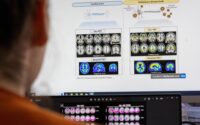Obese kids show alarming cognitive differences than lighter peers: study
Pre-teens who are overweight or obese have stark differences in cognitive function and brain structure than their thinner counterparts, according to a new study.
The team at Boston Children’s Hospital found that pre-teens who were obese had more trouble solving problems and thinking logically.
The brain circuits that bear “higher-level cognitive functions, reward, emotional processing, and attention” were found to be less organized and less well-connected in those who had a higher weight, reported South West News Service.
Their findings, which were published in the International Journal of Obesity, are drawing concern from doctors.
“It raises an alarm that it’s important to track adolescents’ brain health, especially when they have excess BMI,” study leader Dr Caterina Stamoulis, a researcher in Adolescent Medicine and director of the Computational Neuroscience Laboratory at Boston Children’s Hospital, said in a press release.
She noted that it is happening at a crucial age when children’s brains are still in the process of developing.
“Early adolescence is a time when the brain is very actively developing, and when frontal areas of the brain, those involved in higher cognitive functions, change enormously and are vulnerable to miswiring,” she continued.
In gathering data, the team studied 5,000 pre-teens who were aged 9 to 10 years old at 21 sites across the United States.

They gathered the group from the Adolescent Brain Cognitive Development (ABCD) study, which is a government-funded program that looks at brain and child health.
The researchers at Boston Children’s Hospital found that their findings were the same even after they altered certain factors like screen time, amount of sleep, depression, physical activity and self-worth.
However, they did note that while they couldn’t prove the causation between a higher BMI and lower cognitive function, there was a “significant” association between the two as they compared to pre-teens at a lower weight.
In the United States, there is a high rate of childhood obesity – data taken between 2017 to 2020 showed that the epidemic affected about 14.7 million children, according to the Centers for Disease Control and Prevention.

The team that performed the study plans to do a follow-up in two years in order to further understand how the subject’s brains have developed.
“Once the brain is done wiring, it’s more difficult to intervene,” said Stamoulis. “We want to see what neurodevelopmental trajectories these youth are on.”
However, this is not the only study that has found a potential connection between obesity and brain function.
In 2018, a research paper published in the Journal of Neuroscience found that a study involving mice showed diminished brain power in animals that were very overweight.
Last year, some doctors from Baylor College of Medicine in Texas even called for obesity to be reclassified as a “brain development disorder,” like ADHD or Asperger’s syndrome.


